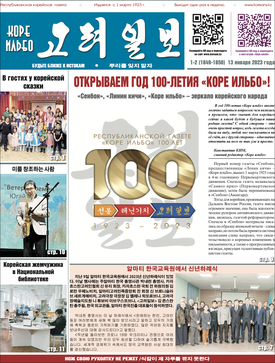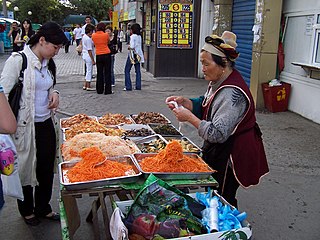
The deportation of Koreans in the Soviet Union was the forced transfer of nearly 172,000 Soviet Koreans from the Russian Far East to unpopulated areas of the Kazakh SSR and the Uzbek SSR in 1937 by the NKVD on the orders of Soviet leader Joseph Stalin and Chairman of the Council of People's Commissars of the Soviet Union Vyacheslav Molotov. 124 trains were used to resettle them 6,400 km to Central Asia. The reason was to stem "the infiltration of Japanese espionage into the Far Eastern Krai", as Koreans were at the time subjects of the Empire of Japan, which was the Soviet Union's rival. However, some historians regard it as part of Stalin's policy of "frontier cleansing". Estimates based on population statistics suggest that between 16,500 and 50,000 deported Koreans died from starvation, exposure, and difficulties adapting to their new environment in exile.
Koryo-saram or Koryoin are ethnic Koreans of the former Soviet Union, who descend from Koreans that were living in the Russian Far East.
German Nikolaevich Kim is Director of the Institute for Asian Studies at Al-Farabi University, Kazakhstan and one of the leading internationally recognized scholars on ethnic Koreans in the former Soviet Union: Koryo-saram.

Russia–South Korea relations or Russian–South Korean relations are the bilateral foreign relations between Russia and South Korea. Modern relations between the two countries began on September 30, 1990. Due to the 2022 Russian invasion of Ukraine, relations became very tense after South Korea imposed sanctions against Russia. Russia placed South Korea on a list of "unfriendly countries", along with Taiwan, Japan, Singapore, the United States, European Union members, NATO members, Australia, New Zealand, Switzerland, Micronesia and Ukraine.

Kazakhstan–South Korea relations are the international relations between Kazakhstan and the South Korea.

Ushtobe is a town and seat of Karatal District in the Jetisu Region of south-eastern Kazakhstan. Population: 24,895 ; 22,472.
There is a population of ethnic Koreans or Korean nationals in Ukraine. A significant group among them are ethnic Koreans called Koryo-saram: these people arrived in the former Soviet Union before and during the Japanese colonial period and spread throughout the region especially after their forced migration in 1937. Another group, the Sakhalin Koreans, who lived on the island of Sakhalin and are often considered culturally distinct from other Koryo-saram. There are also South Korean expatriates in Ukraine.

ALZhIR, the Akmolinsk Camp of Wives of Traitors to the Motherland, was a colloquial name for the 17th special female camp detachment of the Karlag, Karaganda labor camp of the Gulag in the Akmola Region of Kazakhstan. The name comes from the fact that the majority of the inmates were the ChSIR: members of the families of traitors to the Motherland after NKVD Order 00486 of 15 August 1937. Over 18,000 women spent some time in the camp during its existence, and about 8,000 women served a full sentence there, of which 4,500 were ChSIR. The name was an ironical joke of the inmates, because "Алжир" means "Algeria" in Russian.

Kim Pen Hwa was the chairman of the collective farm 'Polyarnaya Zvezda' in the Uzbek SSR and twice Hero of Socialist Labour.

The Koryo Ilbo is a newspaper published in Korean and Russian from Almaty, Kazakhstan, for Koryo-saram: ethnic Koreans of the former Soviet Union. First published in 1923 as the March 1 Newspaper, it changed its name to Sŏnbong, then to Lenin Kichi in 1938, and finally to Koryo Ilbo after the dissolution of the Soviet Union in 1991. It is notable for being one of the oldest Korean-language newspapers and the oldest active outside of the Korean peninsula, having celebrated its 100th anniversary in 2023. It was also for decades the only Korean-language newspaper with nationwide availability in the Soviet Union and a significant promoter of the literature of Koryo-saram, during a period when regional languages were suppressed by the government.

Hambak Village is a neighborhood in Yeonsu District, Incheon, South Korea. It is home to a significant foreign population, and has been called "Russia Town".

Koryo-saram are ethnic Koreans of the former Soviet Union. They have a distinct style of cuisine that is descended from Korean cuisine and influenced by the cuisines of various countries they have lived in. They are often considered distinct from Sakhalin Koreans, another Korean group from the former Soviet Union that has their own cuisine.

The Ussuriysk Korean Cultural Center is a branch of the South Korean organization Korean Cultural Centers in Ussuriysk, Primorsky Krai, Russia. It was built in 2009, and serves as an activity center for Koryo-saram: ethnic Koreans of the former Soviet Union. It also houses the Maritime Territory Koryo-saram Cultural Association.

Gwangju Koryoin Village (Korean: 광주고려인마을) is an enclave of Koryo-saram in Wolgok-dong, Gwangsan District, Gwangju, South Korea. Along with Ansan's Ttaetgol Village, it is one of the largest communities of Koryo-saram in the country. It had around 7,000 Koryo-saram residents by 2022.

The Korean Theatre or Koryo Theatre is a national theatre that specializes in the culture of Korea in Almaty, Kazakhstan. It is operated by and associated with the Koryo-saram community: ethnic Koreans of the former Soviet Union. The theatre troupe has operated since 1932, making it the oldest still-running Korean theatre troupe in the world, including in Korea.
The Friendship Park of the Republic of Kazakhstan and the Republic of Korea or Kazakhstan–Korea Friendship Park is a park currently under construction on Bastobe Hill, Ushtobe, Kazakhstan.
Siryak-tyamuri or sirak-jangmul is a stew in Koryo-saram cuisine that uses fermented soybean paste as the primary flavorant for the broth. It is a descendent of the Korean dish siraegidoenjang-guk, and prominently features siraegi, dried radish stems.
All Nations Baptist Church is a Russian-language Baptist congregation in the Park Slope neighborhood of Brooklyn, New York City, United States. It shares facilities with the Park Slope Community Church. The congregation is often associated with Koryo-saram: ethnic Koreans of the mainland former Soviet Union. It has been described as the only such Koryo-saram church in New York City.

Sinhanch'on was an enclave of Koreans in Vladivostok that existed between 1911 and 1937, during which time the city was controlled for periods by the Russian Empire, Far Eastern Republic and finally the Soviet Union.













